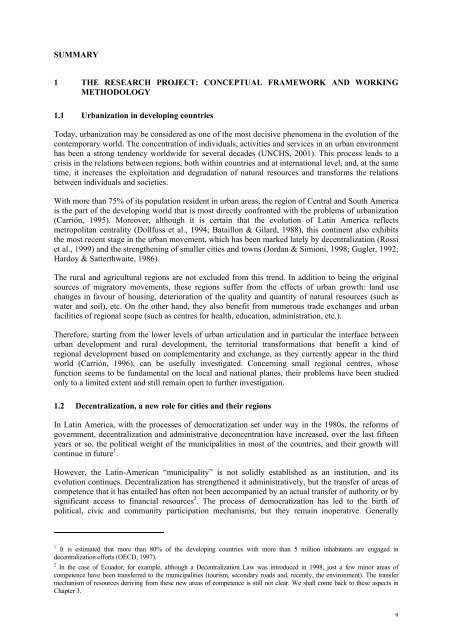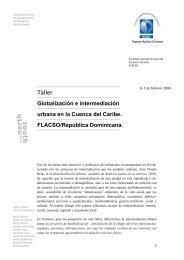interfase urbano-rural en ecuador hacia un desarrollo territorial ...
interfase urbano-rural en ecuador hacia un desarrollo territorial ...
interfase urbano-rural en ecuador hacia un desarrollo territorial ...
Create successful ePaper yourself
Turn your PDF publications into a flip-book with our unique Google optimized e-Paper software.
SUMMARY<br />
1 THE RESEARCH PROJECT: CONCEPTUAL FRAMEWORK AND WORKING<br />
METHODOLOGY<br />
1.1 Urbanization in developing co<strong>un</strong>tries<br />
Today, urbanization may be considered as one of the most decisive ph<strong>en</strong>om<strong>en</strong>a in the evolution of the<br />
contemporary world. The conc<strong>en</strong>tration of individuals, activities and services in an urban <strong>en</strong>vironm<strong>en</strong>t<br />
has be<strong>en</strong> a strong t<strong>en</strong>d<strong>en</strong>cy worldwide for several decades (UNCHS, 2001). This process leads to a<br />
crisis in the relations betwe<strong>en</strong> regions, both within co<strong>un</strong>tries and at international level, and, at the same<br />
time, it increases the exploitation and degradation of natural resources and transforms the relations<br />
betwe<strong>en</strong> individuals and societies.<br />
With more than 75% of its population resid<strong>en</strong>t in urban areas, the region of C<strong>en</strong>tral and South America<br />
is the part of the developing world that is most directly confronted with the problems of urbanization<br />
(Carrión, 1995). Moreover, although it is certain that the evolution of Latin America reflects<br />
metropolitan c<strong>en</strong>trality (Dollfuss et al., 1994; Bataillon & Gilard, 1988), this contin<strong>en</strong>t also exhibits<br />
the most rec<strong>en</strong>t stage in the urban movem<strong>en</strong>t, which has be<strong>en</strong> marked lately by dec<strong>en</strong>tralization (Rossi<br />
et al., 1999) and the str<strong>en</strong>gth<strong>en</strong>ing of smaller cities and towns (Jordan & Simioni, 1998; Gugler, 1992;<br />
Hardoy & Satterthwaite, 1986).<br />
The <strong>rural</strong> and agricultural regions are not excluded from this tr<strong>en</strong>d. In addition to being the original<br />
sources of migratory movem<strong>en</strong>ts, these regions suffer from the effects of urban growth: land use<br />
changes in favour of housing, deterioration of the quality and quantity of natural resources (such as<br />
water and soil), etc. On the other hand, they also b<strong>en</strong>efit from numerous trade exchanges and urban<br />
facilities of regional scope (such as c<strong>en</strong>tres for health, education, administration, etc.).<br />
Therefore, starting from the lower levels of urban articulation and in particular the interface betwe<strong>en</strong><br />
urban developm<strong>en</strong>t and <strong>rural</strong> developm<strong>en</strong>t, the <strong>territorial</strong> transformations that b<strong>en</strong>efit a kind of<br />
regional developm<strong>en</strong>t based on complem<strong>en</strong>tarity and exchange, as they curr<strong>en</strong>tly appear in the third<br />
world (Carrión, 1996), can be usefully investigated. Concerning small regional c<strong>en</strong>tres, whose<br />
f<strong>un</strong>ction seems to be f<strong>un</strong>dam<strong>en</strong>tal on the local and national planes, their problems have be<strong>en</strong> studied<br />
only to a limited ext<strong>en</strong>t and still remain op<strong>en</strong> to further investigation.<br />
1.2 Dec<strong>en</strong>tralization, a new role for cities and their regions<br />
In Latin America, with the processes of democratization set <strong>un</strong>der way in the 1980s, the reforms of<br />
governm<strong>en</strong>t, dec<strong>en</strong>tralization and administrative deconc<strong>en</strong>tration have increased, over the last fifte<strong>en</strong><br />
years or so, the political weight of the m<strong>un</strong>icipalities in most of the co<strong>un</strong>tries, and their growth will<br />
continue in future 1 .<br />
However, the Latin-American “m<strong>un</strong>icipality” is not solidly established as an institution, and its<br />
evolution continues. Dec<strong>en</strong>tralization has str<strong>en</strong>gth<strong>en</strong>ed it administratively, but the transfer of areas of<br />
compet<strong>en</strong>ce that it has <strong>en</strong>tailed has oft<strong>en</strong> not be<strong>en</strong> accompanied by an actual transfer of authority or by<br />
significant access to financial resources 2 . The process of democratization has led to the birth of<br />
political, civic and comm<strong>un</strong>ity participation mechanisms, but they remain inoperative. G<strong>en</strong>erally<br />
1 It is estimated that more than 80% of the developing co<strong>un</strong>tries with more than 5 million inhabitants are <strong>en</strong>gaged in<br />
dec<strong>en</strong>tralization efforts (OECD, 1997).<br />
2 In the case of Ecuador, for example, although a Dec<strong>en</strong>tralization Law was introduced in 1998, just a few minor areas of<br />
compet<strong>en</strong>ce have be<strong>en</strong> transferred to the m<strong>un</strong>icipalities (tourism, secondary roads and, rec<strong>en</strong>tly, the <strong>en</strong>vironm<strong>en</strong>t). The transfer<br />
mechanism of resources deriving from these new areas of compet<strong>en</strong>ce is still not clear. We shall come back to these aspects in<br />
Chapter 3.<br />
9




